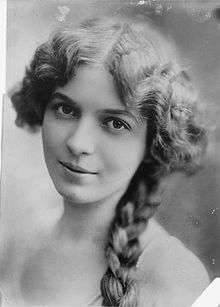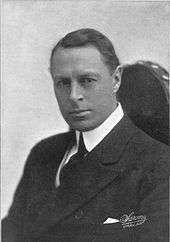The Gold Diggers (1919 play)
| The Gold Diggers | |
|---|---|
 Broadway program | |
| Written by | Avery Hopwood |
| Date premiered | September 30, 1919 |
| Place premiered | Lyceum Theatre |
| Original language | English |
| Genre | Farce |
The Gold Diggers is a play written by Avery Hopwood. It popularized the use of the term "gold digger" to refer to women who seek wealthy partners, as opposed to the earlier usage referring to gold miners. Producer David Belasco staged it on Broadway in 1919, with Ina Claire in the lead role. It was a hit, running for two consecutive seasons before going on tour.
Plot
Stephen Lee is a wealthy man who is convinced that the chorus girl engaged to his nephew is a "gold digger" who only wants his nephew's money. Lee turns to Jerry Lamar, another chorus girl that he knows, asking her to convince his nephew to break off the engagement. She takes the opposite tack, trying to convince Lee that not all chorus girls are out for money. Unfortunately for her effort, several of her friends demonstrate that they are as money hungry as Lee fears. Annoyed by Lee's comments, Lamar decides to show him up by getting him drunk and tricking him into proposing to her. Her scheme proves harmless when it turns out that she and Lee really are in love.
Productions
The play's Broadway opening was at the Lyceum Theatre on September 30, 1919. It ran on Broadway until June 1921, with 720 performances. It then went on tour across the United States until 1923. In this time the play earned over $1.9 million.[1][2]
The characters and cast from the Broadway production are given below:


| Character | Broadway cast[3] |
|---|---|
| Jerry Lamar | Ina Claire |
| Wally Saunders | Horace Braham |
| Sadie | Louise Burton |
| Gypsy Montrose | Gladys Feldman |
| Mrs. Lamar | Louise Galloway |
| Eleanor Montgomery | Luella Gear |
| Tom Newton | William Goodridge |
| Mabel Munroe | Jobyna Howland |
| Cissie Gray | Loraine Lally |
| Freddie Turner | Day Manson |
| Stephen Lee | Bruce McRae |
| Marty Woods | Arthur Miles |
| James Blake | H. Reeves-Smith |
| Fenton Jessup | A.E. Scott |
| Trixie Andrews | Lilyan Tashman |
| Topsy St. John | Ruth Terry |
| Barney Barnett | Frederick Truesdell |
| Dolly Baxter | Katharine Walsh |
| Violet Dayne | Beverly West |
Reception and legacy
Reviews for the play were mixed.[4] In The New York Times, Alexander Woollcott said it was "screamingly funny at times and rather dull at others".[5] A critic for The Drama called it "vulgar and immoral" and said it gave the wrong impression of chorus girls.[6]
The opinions of reviewers did not stop the play from being a hit. One result of its long run was that after other plays he had written opened in 1920, Hopwood eventually had four shows running on Broadway simultaneously.[4] The play and the string of movies it inspired also helped to popularize the use of the term "gold digger" to refer to acquisitive women, a usage that Hopwood did not invent but which was relatively new at the time.
Adaptations
The play was adapted as a movie on multiple occasions:
- The Gold Diggers (1923)
- Gold Diggers of Broadway (1929)
- Gold Diggers of 1933 (1933)
- Painting the Clouds with Sunshine (1951)
Gold Diggers of 1933 spawned multiple sequels that were not directly based on Hopwood's play: Gold Diggers of 1935, Gold Diggers of 1937, and Gold Diggers in Paris.
References
- ↑ Gelsey, Erwin; Seymour, James (1980). Hove, Arthur, ed. Gold Diggers of 1933. Madison, Wisconsin: Univ of Wisconsin Press. p. 23. ISBN 0-299-08084-6.
- ↑ Timberlake, Craig (1954). The Bishop of Broadway: The Life & Work of David Belasco. New York: Library Publishers. p. 456.
- ↑ Unless otherwise cited, all cast info is from "The Gold Diggers". Internet Broadway Database. Retrieved May 1, 2014.
- 1 2 Bader, Arno L. (Autumn 1959). "Avery Hopwood, Dramatist". Michigan Alumnus Quarterly Review: A Journal of University Perspectives. 66 (10): 65–66.
- ↑ Woollcott, Alexander (October 1, 1919). "Mr. Belasco's Season Begins". The New York Times. Retrieved May 1, 2014.
- ↑ Sloan, J. Vandervoort (October–November 1921). "The Loop Has a Thousand Eyes". The Drama. 12 (1): 24.